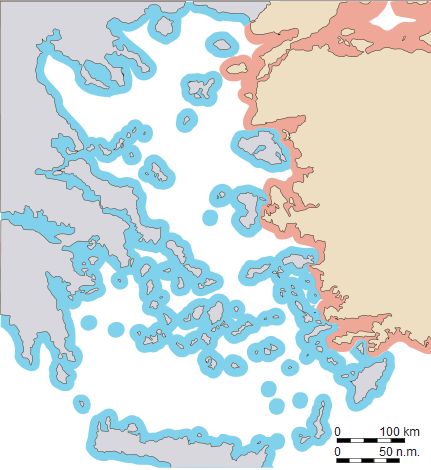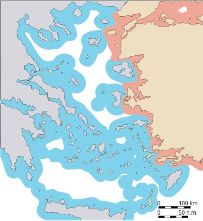Greek territorial waters
The territorial waters of Greece extend to 6 n.m. from the natural coastline, according to two legislation for the coastal zone of Greece. The article of L. 230/1936 on the determination of the coastal zone of Greece (Government Gazette A '450) and article 139 of the L. 187/1973 (Government Gazette A' 261). In 2020, Greece expanded part of its territorial wates to 12 nautical miles in the Ionian Sea, from the Ionian Islands to Cape Tainaro in the Peloponnese. This change was declared by a Presidential Decree on the closure of bays and the drawing of straight baselines, which entered into effect with its publication in the Government Gazette on 27/12/2020. It is the first time since 1947 that Greece expands its national area (by 10,079 sqkm), or more than 13,000 sqkm if we add the closure of the bays. This constitutes an increase of almost 10% of the total sovereign area of the country.
On January 13, 2021, the Greek Minister of Foreign Affairs during the voting of the bill for the 12nm in the Ionian Sea declared that "I repeat the words of the Prime Minister of the country Mr. Kyriakos Mitsotakis, who said that the next phase (of territorial waters expansion) will focus on the region south of Crete. Relevant studies are being conducted on achieving this."

It is worth noting that according to international law the range of territorial waters in some cases may be less than 6 nm, depending on the application of the midline rule or related billateral arrangements between countries. This means that where the distance from the shores of another state is less than the sum of the width of the respective territorial waters, this distance is shared equally between them. This is the case of the east coast of the islands of the Eastern Aegean and the Dodecanese, where the customary rule of the midline -which is incorporated in Article 15 of the UN Convention for the Law of the Sea (1982)- applies.
The demarcation in the Dodecanese region is conventionally derived from the Agreement of 4 January 1932 and the Protocol of 28 December 1932 between Italy and Turkey. Greece entered this agreemnt as the successor state, based on Article 14 (1) of the Paris Peace Treaty of 10 February 1947, which granted the sovereignty of the Dodecanese to Greece.
Naturally, not only the mainland but also every island has territorial waters. Thus, Volos, a coastal city in Greece, has six miles of territorial waters towards the Aegean, but also Skiathos (a Greek island in the Aegean) has territorial waters within a radius of six miles around it.
| Country | Aegean percentage |
|---|---|
| Greece | |
| Turkey | |
| National waters |
Turkey does not object to islands having their own territorial waters, however the country disputes the ownership of hundreds of rocky islets in the Aegean (those that are not included by name in the conditions of their concession to Greece) and at the same time, it opposes any changes to the existing status quo in the Aegean by not allowing Greece to economically exploit rocky islets that belong to her, but currently have no inhabitants or economic activity and therefore are not assigned their own coastal zone.
Extension to 12 miles

According to International Law, customary and conventional, Greece has the right to extend her territorial waters to 12 n.m.. During the ratification of the UN Convention for the Law of the Sea, the country's representatives stated that "the time and place for exercising these rights is an issue which is realted to our national strategy, which does not imply in the slightest the waiving of those rights". In addition, Article 2 of Law 2321/1995, ratifying the Convention on the Law of the Sea, provides that "Greece has the inalienable right pursuant to Article 3 of the ratified Convention to extend at any time the breadth of het territorial sea to a distance of 12 n.m.
If Greece increases its coastal zone to 12 miles, much larger parts of the Aegean will now be considered Greek territory, in contrast to the current situation where there are larger corridors between the islands (international waters), through which Turkish and other ships can pass freely and without the permission of the Greek authorities. The right to extend the territorial waters up to 12 n.m. has already been practiced by many states including Turkey, which since 1964 has extended its territorial waters to the Black Sea and the Mediterranean to 12 n.m.
| Country | Aegean percentage |
|---|---|
| Greece | |
| Turkey | |
| National waters |
On the contrary, in the Aegean, on the occasion of the entry into force of the Convention on the Law of the Sea, Turkey threatened that it considers as a casus belli the possible extension of Greek territorial waters. On the occasion of the ratification of the aforementioned Convention by Greece on 31/5/1995, the Turkish National Assembly issued a resolution on 8/6/1995, which delegates to the Turkish government all responsibilities, including the military, for the maintenance and defending the vital interests of Turkey. This resolution remains in force to date. The threat of violence (casus belli) violates Article 2 par. 4 of the Charter of the United Nations, which prohibits Member States from threatening or using violence in international relations.
Future developments
International law is shaped by the written texts, but also by the international practice of the countries involved, and even by the statements of the representatives of each country in international fora. Turkey, while having the international law against its interests, taking full advantage of what it can gain through official statements and the actions of its army, is gaining points against Greece. On the contrary, the Greek leaders consistently omit any statement that the country has the right of 12 miles. If this situation continues, then international law accepts that international custom and practice prevail over written law, that is, treaties.
The international conditions are on the side of Greece, which, however, faces not only Turkey, but - tacitly - the entire international community that does not accept restrictions on navigation. Any extension of Greek territorial waters must definitely take into account the concerns of the international community.
Turkish territorial waters violations
| Year | 2010 | 2011 | 2012 | 2013 | 2014 | 2015 | 2016 | 2017 | 2018 | 2019 | 2020 |
|---|---|---|---|---|---|---|---|---|---|---|---|
| Violations | 133 | 206 | 389 | 341 | 371 | 299 | 414 | 1.998 | 1.479 | 2.202 | 2.108 |
Το άρθρο συνεχίζεται...
- Timeline of Greek-Turkish disputes - The milestones of a cold war
- Exclusive Economic Zone - Above and beyond the continental shelf
- Hellenic national airspace - The discrepancy with the territorial waters
- Territorial waters - The Law of the Sea and its applicability
